A non-toxic slow cooker is a cooking appliance designed to be free from harmful chemicals and toxins. These slow cookers are made from materials that are considered safe for cooking, such as ceramic, stainless steel, and glass.
Unlike regular slow cookers, non-toxic slow cookers do not contain materials that can leach into the food during cooking, ensuring that the food is safe to consume.
Compared to regular slow cookers, non-toxic slow cookers offer several benefits.
For one, they are considered safer to use, as they do not expose users to harmful chemicals. This makes them an excellent choice for individuals who are concerned about the health risks associated with exposure to toxins.
Additionally, non-toxic slow cookers are often more durable and longer-lasting, as they are made from materials that are resistant to wear and tear.
Another benefit of using a non-toxic slow cooker is that it can enhance the flavor and nutrition of the cooked food.
Using a non-toxic slow cooker, food can be cooked at a lower temperature for a longer period, allowing the flavors to meld together and the nutrients to be preserved. This results in food that is not only safe to consume but also delicious and healthy.
In this blog, we will discuss the types of materials used in non-toxic slow cookers and the best non-toxic slow cookers.
What Types of Materials Used in Non-Toxic Slow Cookers?
Non-toxic slow cookers are becoming increasingly popular among health-conscious individuals who want to cook their food without the use of harmful chemicals and toxins. When choosing a non-toxic slow cooker, the type of material used is an important consideration.
The most common materials in non-toxic slow cookers are ceramic, stainless steel, and glass. Ceramic slow cookers are popular because they distribute heat evenly, which helps to ensure that food is cooked evenly.
They are also durable and long-lasting, making them an excellent investment. However, slow ceramic cookers are heavy and can break easily if dropped.
Stainless steel slow cookers are also a popular choice. They are lightweight and durable, making them easy to use and long-lasting. Stainless steel is also resistant to rust and corrosion, making it an excellent choice for slow cookers.
However, stainless steel slow cookers can be more expensive than other types of slow cookers, and they do not distribute heat as evenly as slow ceramic cookers.
Glass slow cookers are another popular choice. They are transparent, allowing you to see the food as it cooks. Glass is also an excellent material for slow cookers because it does not react with food or absorb odors or flavors.
However, glass is not as durable as ceramic or stainless steel and can break if dropped.
Ultimately, the type of material you choose will depend on your personal preferences and cooking needs.
Features to Look for in a Non-Toxic Slow Cooker
When shopping for a non-toxic slow cooker, there are several important features to consider to ensure that you choose a safe and reliable product.
Materials:
One of the most important features to consider when choosing a non-toxic slow cooker is the type of materials used in its construction. As mentioned in our previous article, ceramic, stainless steel, and glass are all common materials used in non-toxic slow cookers.
Make sure to choose a slow cooker that is made from materials that are safe for cooking and free from harmful chemicals like lead and cadmium.
Type of Coating on the Cooking Pot:
Many non-toxic slow cookers have a non-stick coating on the cooking pot to prevent food from sticking. However, some non-stick coatings can be harmful if they are scratched or flaked off and ingested.
Look for a non-toxic slow cooker with a non-stick coating that is free from PFOA and PTFE, which are potentially harmful chemicals.
Safety Certifications:
It’s important to choose a non-toxic slow cooker that has been tested and certified by a reputable safety organization. Look for slow cookers that have been certified by organizations like the Underwriters Laboratories (UL) or the Canadian Standards Association (CSA).
These certifications ensure that the product has been tested for safety and meets strict standards for quality.
Temperature Controls:
Another important feature to consider is the temperature control options on the slow cooker. Look for a slow cooker that has adjustable temperature settings, so you can easily adjust the heat to suit the type of food you are cooking.
Some slow cookers also have programmable settings that allow you to set the cooking time and temperature in advance.
Size and Capacity:
Non-toxic slow cookers come in various sizes and capacities, so it’s important to choose one that is the right size for your needs. If you cook for a small family, a 4-quart slow cooker may be sufficient.
However, if you often entertain guests or cook large batches of food, you may want to choose a larger slow cooker with a capacity of 6 or 8 quarts.
Considering these features, you can choose a safe and reliable non-toxic slow cooker that meets your cooking needs.
Top 5 Non-Toxic Slow Cookers
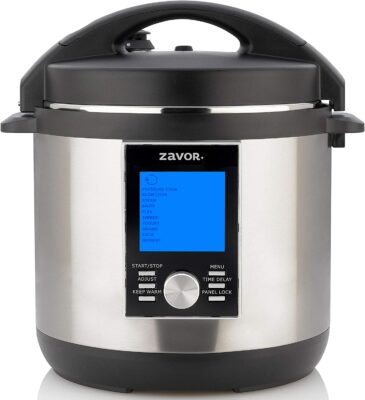
Zavor LUX Quart Programmable Electric Multi-Cooker
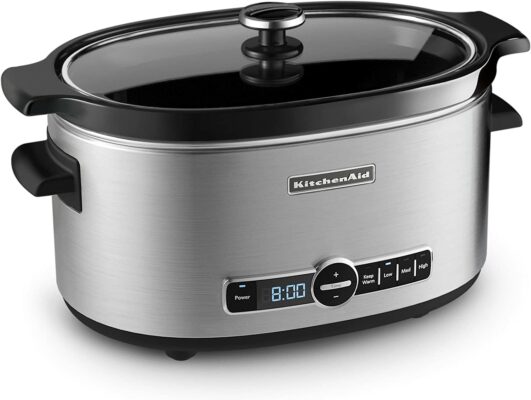
KitchenAid Slow Cooker with Standard Lid
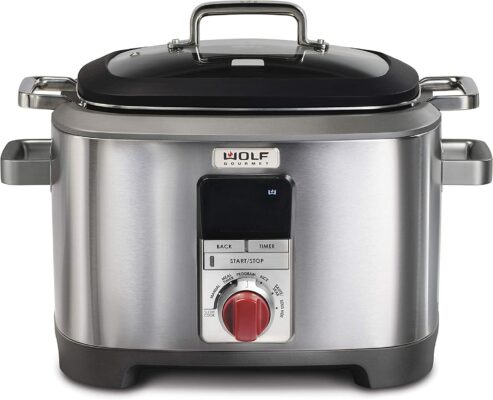
Wolf Gourmet Programmable Multi Cooker with Temperature Probe
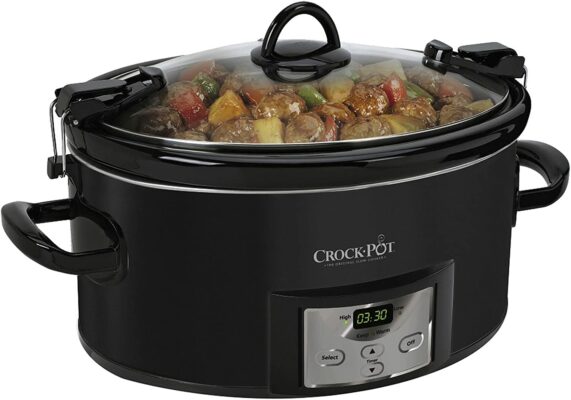
Crock Pot Cook n Carry Programmable Countdown Slow Cooker
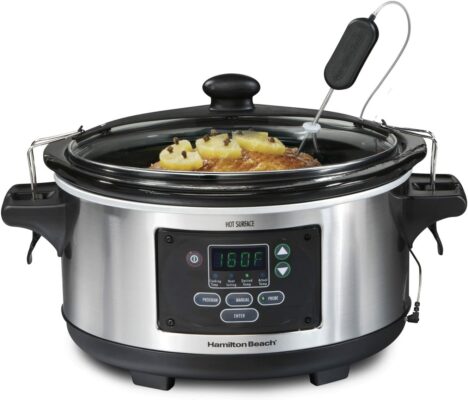
Hamilton Beach Portable Slow Cooker
Tips for Using a Non-Toxic Slow Cooker Safely
A slow cooker is a convenient and popular kitchen appliance that can help busy people prepare healthy meals with minimal effort.
However, many slow cookers contain toxic chemicals that can leach into food and harm your health over time. To avoid this, it’s essential to choose a non-toxic slow cooker and use it safely.
Here are some tips to help you do that.
Proper Cleaning and Maintenance
To ensure your slow cooker is free of harmful chemicals and bacteria, it’s important to clean it thoroughly before and after each use.
Start by washing the removable stoneware insert with warm, soapy water and a soft sponge or cloth. Rinse it well and let it air dry or dry it with a clean towel. Clean the exterior of the slow cooker with a damp cloth or sponge, and avoid using abrasive cleaners or scrubbers that can damage the surface.
If your slow cooker has a non-stick coating, be extra careful not to scratch it.
Safe Food Handling Practices
Always handle food safely when using a slow cooker to prevent foodborne illnesses. Start by washing your hands with soap and water before preparing food. Use clean utensils, cutting boards, and plates to avoid cross-contamination.
Thaw frozen food in the refrigerator, not on the counter or in the slow cooker. Don’t overload the slow cooker with food; ensure it reaches a safe internal temperature (165°F or higher) before serving.
Keep the lid on the slow cooker to retain heat and avoid opening it unnecessarily, as this can prolong cooking time and increase the risk of bacterial growth.
Cooking Tips and Tricks
Try these cooking tips and tricks to get the most out of your slow cooker. Cut food into small, uniform pieces to ensure even cooking. Add liquids such as water, broth, or wine to keep the food moist and prevent it from burning.
Layer ingredients in the slow cooker with denser, tougher ingredients on the bottom and softer, more delicate ingredients on top. Experiment with different herbs, spices, and seasonings to enhance the flavor of your food.
And don’t be afraid to use your slow cooker to make a wide range of dishes, from soups and stews to casseroles and desserts.
Is it safe to cook with non-toxic slow cookers?
Cooking with non-toxic slow cookers is generally safe and can offer many benefits over traditional cooking methods. Non-toxic slow cookers are designed to be free of harmful chemicals such as lead and cadmium, which can leach into food and cause long-term health problems.
Here are some safety benefits of using a non-toxic slow cooker, potential safety risks, and a comparison to other cooking methods.
Safety Benefits of Using a Non-Toxic Slow Cooker
One of the primary safety benefits of using a non-toxic slow cooker is that it reduces the risk of exposure to harmful chemicals. Slow cookers made with non-toxic materials such as ceramic, stainless steel, or glass are less likely to release toxins into the food.
Non-toxic slow cookers are also designed to cook food at a low temperature, reducing the risk of burning and overcooking food and starting a kitchen fire.
Potential Safety Risks and How to Avoid Them
While non-toxic slow cookers are generally safe to use, there are still some potential safety risks to be aware of. One risk is the growth of bacteria if food is not cooked at a high enough temperature or left out too long.
To avoid this, make sure to cook food until it reaches a safe internal temperature of 165°F or higher, and refrigerate leftovers promptly.
Another risk is using unsafe materials in the construction of the slow cooker. To avoid this, always choose a reputable brand that is made from non-toxic materials and has been tested for safety.
Comparison to Other Cooking Methods in Terms of Safety
Compared to other cooking methods, such as frying or grilling, using a non-toxic slow cooker can be safer. Frying and grilling can produce harmful chemicals such as acrylamide and polycyclic aromatic hydrocarbons (PAHs) that have been linked to cancer.
Slow cooking, on the other hand, doesn’t produce these chemicals and can preserve food’s nutritional value by retaining more vitamins and minerals than other cooking methods.
By choosing a non-toxic slow cooker made from safe materials, cooking food at a high enough temperature, and following safe food handling practices, you can enjoy the convenience of slow cooking without compromising your health.
Can I use a non-toxic slow cooker for all types of recipes?
A non-toxic slow cooker can be a versatile kitchen appliance that can be used to prepare a wide range of recipes. However, some recipes are better suited to slow cooking than others.
Here are some guidelines for using a non-toxic slow cooker for cooking different types of recipes, as well as tips for adapting recipes to make them suitable for slow cooking.
Types of Recipes Suited for a Non-Toxic Slow Cooker
Recipes that involve slow cooking and require a long, gentle cooking process are ideal for a non-toxic slow cooker. These include soups, stews, casseroles, curries, and chili. Slow cooking allows the flavors of the ingredients to meld together, creating a rich, complex flavor profile.
Slow cooking is also great for tougher cuts of meat, such as brisket or pork shoulder, which can be cooked for hours until they become tender and flavorful.
Recipes That Should Not Be Cooked in a Slow Cooker
Not all recipes are suitable for slow cooking. Recipes that require a quick cooking time, such as stir-fries, sautés, and seared meats, are not recommended for slow cooking. These types of recipes require high heat and constant stirring, which slow cookers cannot provide.
Additionally, delicate ingredients such as fish or leafy greens may not hold up well in a slow cooker and can become overcooked and mushy.
Tips for Adapting Recipes for Use in a Slow Cooker
To adapt a recipe for use in a slow cooker, follow these tips:
- Use less liquid than you would in a traditional recipe, as slow cooking produces less evaporation than other cooking methods.
- Cut meat and vegetables into small, uniform pieces to ensure even cooking.
- Add ingredients in the right order, starting with the ones that take the longest to cook and adding delicate ingredients towards the end of the cooking time.
- Adjust cooking times based on the recipe and the size of your slow cooker.
- Use the low setting for recipes that require a longer cooking time, such as stews and soups, and the high setting for recipes that require a shorter cooking time, such as chili or pulled pork.
However, it’s important to choose recipes suitable for slow cooking and follow the right techniques to ensure the best results.
With some practice and experimentation, you can adapt many of your favorite recipes to make them suitable for use in a slow cooker.
Frequently Asked Questions
Conclusion
In conclusion, choosing a non-toxic slow cooker for your family can provide many benefits. Non-toxic slow cookers are made with safe and durable materials, such as stainless steel, ceramic, or glass.
They can be used to prepare various recipes, from soups and stews to roasts and casseroles, without worrying about harmful chemicals leaching into your food.
Finally, it’s important to follow safe cooking practices when using a non-toxic slow cooker, such as properly cleaning and maintaining the appliance, using safe food handling practices, and following cooking tips and tricks.
With the right tools and techniques, a non-toxic slow cooker can be a valuable addition to your kitchen and provide healthy, flavorful meals for your family for years to come.
